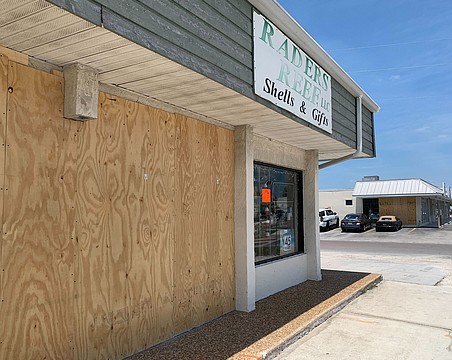Family Jewels
By Jean Gruss
Editor/Lee-Collier
On an island where everyone knows each other's business, this was one of the best-kept secrets.
There was $10 million worth of jewelry inside the safe at Congress Jewelers on Periwinkle Way on Sanibel when Hurricane Charley hit in August 2004. The secret was that any thief with the right tools could have opened it in minutes because the backup generator that powered the safe's alarm system had run out of gas.
To make matters worse, the contents of the safe were only insured if the alarm was powered on. When they were finally allowed to return to the island after six days, owners Scot Congress, 42, and brother Doug Congress, 38, found the jewelry was safe, but the store was destroyed. "It was an agonizing week," recalls Doug Congress.
(Memo to jewelry thieves: The Congresses have changed their procedures.)
How the Congresses rebuilt their store in just three months offers lessons for any business faced with calamity. They were recently awarded the 2005 Southwest Florida Blue Chip Community Business Award, which recognizes a small business that has overcome overwhelming adversity.
When Sanibel took a blow from Charley, debris made the island impassable for nearly a week. Like most everyone, the Congresses had evacuated the island and expected to return within a few days.
Despite pleas from the Congresses, Sanibel city officials and the National Guard said it was too dangerous to let anyone back on the island until the roads were cleared. Some people sneaked back, but the Congresses decided against that option. Checking on the jewels would have to wait.
Meanwhile, the brothers fretted over whether their insurance would cover the damage. Scot Congress, a certified public accountant, had negotiated the insurance contract with Wisconsin-based Jewelers Mutual that covered the inventory and the business interruption. Despite having gone over the contract closely before the storm, he wasn't sure whether the insurance company would come through.
"Until you take your policy for a test drive, you really don't know what's going to be covered," he says.
The Congresses pay $250,000 a year in premiums for a policy that covers the inventory, business interruption and payroll. Despite the high cost, there were many exceptions that didn't cover business interruption. For example, coverage wouldn't kick in if the store lost power but was still structurally sound.
When they returned to the store after six anxious days, the place was flooded, and everything except the safe was destroyed. Meanwhile, the storm had peeled off the roof of Scot's house behind the store and water flooded his home for a week. Doug's house further east on the island was unscathed.
Now that they were certain the damage was covered, the Congresses had to determine how much revenue they would lose. They went back three years to review the same months of September, October and November and made an educated guess. "We kept impeccable records," says Doug Congress. The brothers had made backups of all their records and printed them as well. As a result, the insurance company didn't contest the figures.
After surveying the damage, the Congress brothers realized they had to open by December, the most critical month for the jewelry business. Looking back, they figured they lost about $2 million in revenues over three months but could have lost double that amount if they missed December. That month alone accounts for 20% of the company's annual revenues (The brothers decline to reveal overall annual revenues).
But the Congresses were more concerned about losing market share than revenues. Repeat customers make up about 80% of their sales, and the Congresses feared they would lose them to competitors. Insurance would have covered them through December, but losing market share would have hurt long term.
To keep customers from defecting, the brothers never stopped advertising in the Island Sun weekly newspaper. Their ads updated customers about the progress they were making rebuilding the Sanibel store. They also rented space on a billboard near the island bridge and called on individual customers. At Rotary and Kiwanis gatherings, they let other businesses know they were committed to reopening.
Fortunately, their business interruption insurance also covered payroll. The Sanibel store's 17 employees continued to be paid and received benefits while they worked at the company's three other stores in Bonita Springs, Naples and Key West.
The Congress brothers targeted Luminary Night on Dec. 3, 2004, as the reopening date, one of Sanibel's biggest events.
But the brothers soon realized that their goal might have been too ambitious. The most critical components of any jewelry store are the display cases that show off the sparkling jewelry. They're custom-made and have sophisticated lighting and alarm systems that can't be assembled overnight.
The brothers scrambled, eventually finding an Arizona craftsman with the help of a friend who also runs a jewelry business.
The store needed about 200 linear feet of display cases, each designed to exact specifications. Arizona Display Works delivered the cases in mid-November, and it took a week and a half to install them. Then, escorted by police cruisers, Scot and Doug Congress drove 3,000 pieces of jewelry back to the island in three trips four days before Luminary Night. "It was a major amount of sweating," Scot Congress recalls.
In addition to the display cases, the gutted store had to be rebuilt too. Competition for labor and materials after the hurricane made this task especially difficult. But they were fortunate. The contractor they used in their Naples store agreed to take on the project.
Meanwhile, hundreds of thousands of dollars worth of unsold inventory sat in the vault of the Bonita Springs store. The Sanibel store had about 200 Rolex watches when the hurricane hit. The Congresses say longstanding relationships with suppliers paid off because they extended terms.
On Luminary Night, the Sanibel store was back in business. "It was spiritual," says Scot Congress. December 2004 turned out to be one of the store's best months ever.
HOW WORKING IN PARADISE BECAME A GEM
Congress Jewelers was born in a beachside cabana.
Patriarch Larry Congress moved to Sanibel in 1981 after a career in jewelry sales and rented sailboats and bicycles out of a cabana at the Casa Ybel Resort.
He had found the rental business through an ad in the local paper that read: "Work in paradise. Need business partner. Inquire at P.O. Box."
Congress soon bought out his partner and started selling jewelry from the cabana. The resort was only too happy to oblige; it got a cut of the business. Larry's son Scot, fresh out of college, joined him soon after, and brother Doug, an accountant, followed in 1993.
The jewelry started selling well, and Larry Congress wanted to get back into the business. He persuaded shoe shop owner Larry Snyderman to let him put two jewelry display cases at the rear of his store in the Periwinkle Place shopping center. By 1985, Larry and Scot Congress were selling about $400,000 worth of jewelry out of the shoe shop, and he decided he needed to open his own store.
The Congresses leased 1,000 square feet next to Snyderman Shoes and pledged the boat-and-bike-rental business for a $25,000 loan. At the time, First Independence Bank had opened a branch on the island and was eager to lend money to entrepreneurs. Scot Congress laughs when he recalls the collateral his family put up for the loan: 50 bicycles and nine sailboats "That stuff was a pile of junk," he chuckles.
As development on the island took off, so did the Congress' business. By 1990, the Congresses needed to hire their own goldsmiths because their suppliers couldn't keep up with them. They developed a popular line of unique jewelry called Sealife by Congress, which are pendants and earrings with replicas of Sanibel shells and sea creatures.
At the height of Sanibel's economic boom in 1990, about 20,000 people would come through the Sanibel store each month. But in the years that followed, traffic started to slow as the resorts and condos built in the 1970s and early 1980s started to show their age and island leaders put a lid on new development. Meanwhile, Larry Congress and his wife Dee decided to retire and pass on the business to their two sons, Scot, 42, and Doug, 38.
So the brothers opened up a second store in fast-growing Bonita Springs. "We were able to save up a lot of money from the Sanibel years, and that helped with the Bonita store," says Doug Congress.
The success of the Bonita Springs store led them to open another one in Key West in 2001 and another in downtown Naples in 2003. They are currently planning their fifth store at Coastland Mall in Naples; it's scheduled to open in October.
Although the Congress brothers decline to talk about the company's finances, they said they are financing their expansion with the help of loans from AmSouth Bank.





